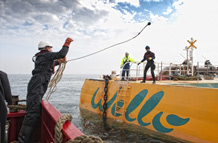Articles

Exeter researchers will conduct biodiversity research at the Wello Penguin wave energy converter at Wave Hub, Cornwall. Picture by Wello
Grant success for University of Exeter researchers at Cornwall’s Wave Hub
Exeter researchers are part of the biodiversity research team of a new EUR 17 million EU Horizon 2020 funded project that will test a new wave energy converter at Wave Hub, the wave power test centre located off the north coast of Cornwall.
The five-year Clean Energy From Ocean Waves (CEFOW) project is being coordinated by Nordic company Fortum and will involve a new design of convertor called the ‘Penguin’ designed by Finnish firm Wello.
The University of Exeter will coordinate biodiversity research at the Wello Penguin installation site at Wave Hub to determine how the device interacts with the marine environment. The Exeter researchers will work closely with colleagues at Plymouth University and Uppsala University.
Dr Matthew Witt from the Environment and Sustainability Institute at the University of Exeter’s Penryn Campus said: “The project partners all bring unique areas of expertise to the biodiversity research we will be conducting at the Penguin wave energy converter. We will work in close coordination on several aspects of the work including acoustic and seabed biodiversity research.”
Heli Antila, Chief Technology Officer at Fortum, said: “Wave power may play an important role in the future as an emissions-free energy production form, and that is why Fortum is participating in the research and development efforts. We believe that the funding from the European Commission and the experienced collaboration partners create excellent conditions for making great strides forward in commercialising Wello’s wave power technology.
“On a global scale, this project is at the vanguard of wave power research.”
The joint project partners are Fortum, Wello Ltd, Mojo Maritime Ltd, Wave Hub Limited, Green Marine (UK) Ltd, Uppsala University, Plymouth University and the University of Exeter.
This project has received funding from the European Union’s Horizon 2020 research and innovation programme under grant agreement No 655594.
Date: 7 May 2015
